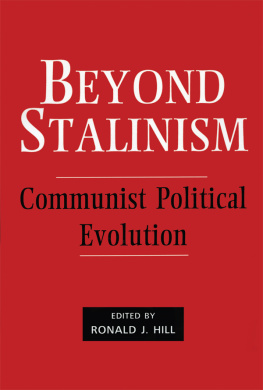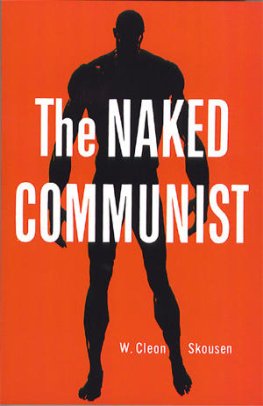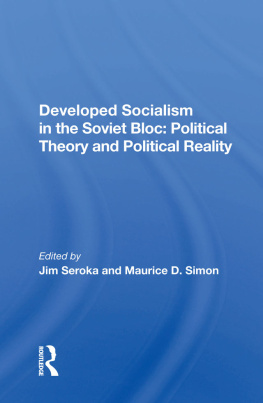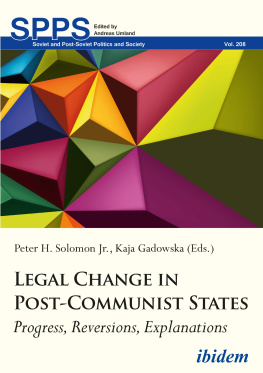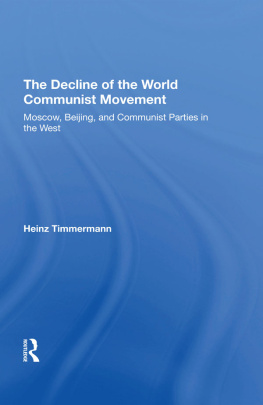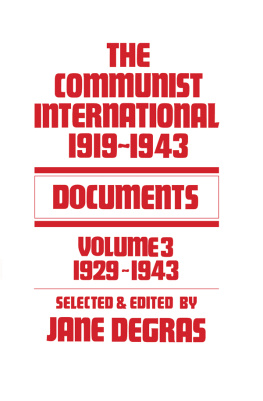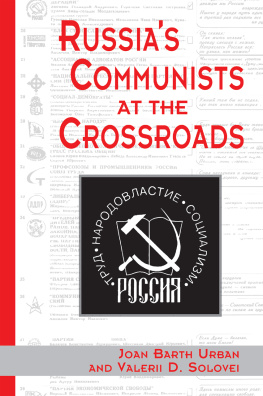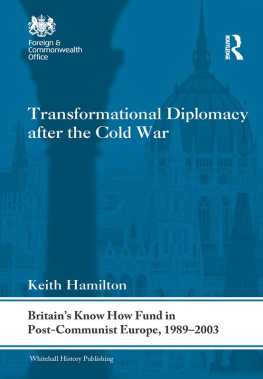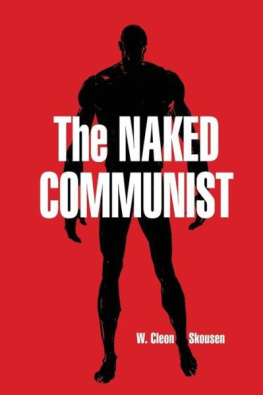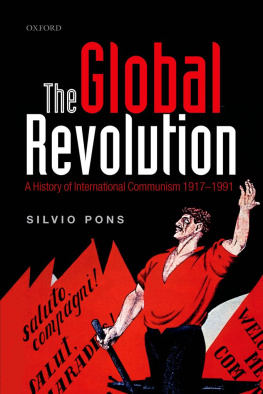BEYOND STALINISM:
COMMUNIST POLITICAL EVOLUTION
BEYOND STALINISM:
COMMUNIST POLITICAL EVOLUTION
edited by
RONALD J. HILL
First published in 1992 by
FRANK CASS & CO. LTD.
This edition published 2013 by Routledge
2 Park Square, Milton Park, Abingdon, Oxon OX14 4RN
711 Third Avenue, New York, NY 10017
Routledge is an imprint of the Taylor & Francis Group, an informa business
Copyright 1992 Frank Cass & Co. Ltd.
British Library Cataloguing-in-Publication Data
Beyond Stalinism: Communist Political
Evolution. (Journal of Communist
Studies Series, ISSN 0268-4535; Vol. 8, No. 1)
I. Hill, Ronald J. II. Series
320.5
ISBN 0-7146-3463-8
Library of Congress Cataloging-in-Publication Data
Beyond Stalinism: Communist political evolution /edited by Ronald J.
Hill.
p. cm.
This group of studies first appeared in a special issue of
Communist studies, vol. 8, no. 1 T.p. verso
Includes index.
ISBN 0-7146-3463-8 (hard): 24.00
1. Communist state. 2. Europe, EasternPolitics and
government19451989. 3. Soviet UnionPolitics and
government19451991. 4. Post-communismEurope, Eastern. 5. Post
-communismSoviet Union. I. Hill, Ronald J., 1943
JC474.B47 1992
This group of studies first appeared in a Special Issue on Beyond Stalinism: Communist Political Evolution of The Journal of Communist Studies, Vol. 8, No. 1, published by Frank Cass & Co. Ltd.
All rights reserved. No part of this publication may be reproduced in any form or by any means, electronic, mechanical, photocopying, recording or otherwise, without the prior permission of the publisher.
Typeset by Regent Typesetting, London
Contents
| Ronald J. Hill |
| Stephen White |
| Paul G. Lewis |
| Shaun Breslin |
| John Hoffman |
| Martin Myant |
| Michael Waller |
| Sten Berglund and and Jan ke Dellenbrant |
| Adam Westoby and Ronald J. Hill |
The related concepts of change, development, evolution and similar ideas with reference to communist political systems has long been an interest of mine indeed, since, as a graduate student at the University of Essex in the 1960s, I pursued a seminar course on totalitarianism. My experience of living in the provinces of the Soviet Union later persuaded me of the inappropriateness of at least a rigid application of that concept, and my subsequent studies of Soviet political life convinced me that below the summit of political power much was taking place that had strong implications for the systems ability to cope.
The work of Soviet scholars in the 1960s and 1970s, about which I wrote in a book published in 1980 (Soviet Politics, Political Science and Reform), demonstrated the existence of theoretical approaches to the increasingly complex Soviet reality that might well lead to significant changes in policy once the unimaginative and complacent Brezhnev leadership left the scene. They also demonstrated the existence of reformist ideas within the communist establishment. Admittedly superficial studies of other socialist countries, particularly in Eastern Europe, suggested parallel scholarly developments there, with similar implications for political life. That generation of thinkers had their opportunity under Gorbachev from 1985 onwards. Events since then have demonstrated the accuracy of some of their critical analyses, while proving that their prescriptions for induced political evolution were too late: the world had moved on.
A further interest has been the interaction between capitalism (or liberal democracy) and communism, particularly the impact of capitalisms technical innovations on some of communisms basic principles of rule. In particular, the penetration of barriers through the general relaxation of East-West tension and, recently, the communications revolution, made the task of conducting an experiment on an isolated, captive population ever more unsustainable. For reasons well argued by other scholars, the transformation of the Stalinist form of communist rule seemed to me to be unavoidable sooner or later. What was not obvious was that the system as such was incapable of reform, and its collapse was inevitable if the peoples who lived under the system were to have any hope of enjoying the standard of living and the civil rights and individual freedoms that I have taken for granted, along with most of the Western world.
The present collection of essays brings together these areas of interest, by using the concept of evolution to explore various forms of change in the communist and post-communist world. I am grateful to the contributors for their efforts in elucidating and illustrating various facets of the concept, and for the wealth of factual information that their case studies bring together. I also thank the members of Lorton House, an independent charitable association that promotes the academic study of communism and related concepts and sponsors The Journal o f Communist Studies, for affording me the opportunity to put together this collection, which I trust readers and students of communism will find of interest and value.
RONALD J. HILL
Communist Politics:
An Evolutionary Approach
RONALD J. HILL
The concept of evolution, despite obvious limitations, offers insights into developmental processes within ruling communism and from communism. A new and evidently vigorous type of political system has rapidly collapsed, to be replaced eventually by multi-party democracy. A system whose central goal was the induced evolution towards a utopian society displayed limited capacity for adaptation to meet changing needs. Following the death of Stalin, modifications to the system permitted the evolution of different strains of communism, without changing the fundamental characteristics of the species. In the 1980s the system demonstrated its inability to adopt survival mechanisms in a society that presented challenges and pressures very different from those that suggested viability in the 1930s and later. After the collapse and near-extinction of communism in power, those societies enter a new stage in their political evolution, in which some genetic material has been transferred, through political culture, from the communist regime.
Until barely three years ago, the world seemed in the twentieth century to have acquired a distinct form of political system: that of communism as a form of rule. It seemed to be a stable system, capable of evolutionary adjustment. By the 1960s, at the latest, differences could be discerned among the various countries that were experiencing such rule, and from the late 1970s a new sub-discipline of political science was developed to examine those distinctions: comparative communism. Whatever the nuances and shades of emphasis, the distinctions of practice, the divergences in laws and the institutional modifications, it was believed that the communist political system had become a permanent feature of world politics.
Indeed, the political geography of the world was defined in terms of such an assumption: East meant communist while West implied The coinage of the term Third World to represent the emerging nations of Asia, Africa and Latin America implied the existence of two previous worlds, one of which (sometimes even called the Second World) referred to the communist-ruled countries. There was an open and explicit hostile rivalry between the free, democratic, bourgeois, capitalist systems of the West, and the communist systems of the East. Moreover, the long-term tendency apparently favoured the communist East, which expanded after the Second World War into Eastern Europe, Asia and Indochina, and from the early 1960s included Cuba, in the 1970s acquired adherents in Africa, and had evidently penetrated Central America following the Sandinistas coming to power in 1979. As late as the autumn of 1990, Robert Mugabe seemed intent on creating such a system in Zimbabwe.
Next page
